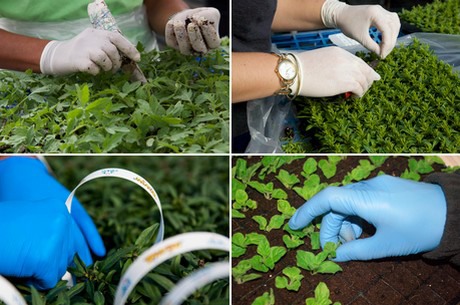
Production cycle of organic plants.
Pushing the product to the market
Currently, the demand for organic herbs is high, but several years ago, when Hishtil decided to start producing organic herb plant propagation materials this was not the case. "There was not a clear demand for organic herbs, but Hishtil's founder Yehezkel Dagan foresaw that this would become the market's orientation. That's why we have decided to start growing organic plant material in 2008. The first plant propagation material was produced in a tunnel on a very small scale. After 1 to 2 years, and after investing a lot of time in pushing our customers towards organic production, the amount of orders increased. This enabled us to enhance the quality of the crop and then, the 'ball started to roll'. We were -and probably still are- one of the few that was able to supply organic herb plant material. And for the last five years, the amount of orders kept increasing significantly".
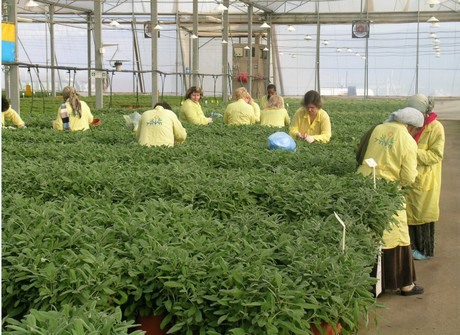
Harvesting cuttings from organic stock plants.
Plant protection is a challenge
However, supplying plant propagation material that has zero residues and is clean of pathogens was and still is a challenging task. "When the young plants leave the greenhouse here in Israel, the grower might grow them in their greenhouse for just two weeks and then they leave his greenhouse to the garden center or supermarket. This is a very short period of time, so when applying chemicals we have to anticipate how much residues the plant still has when the grower ships them out. Since the young plants are organic, the so-called Maximum Residue Levels (MRL's) of the allowed pesticides needs to be zero, so regular pesticides can't be used. Therefore, the use of pesticides, even those registered as organic, should be minimal".
And that brings them to their next challenge, the regulations. The Israeli law for the regulation of Organic products (5765-2005) was established in 2005. The PPIS (Plant Protection and Inspection Services) is the Israeli regulation authority for inspection and accreditation of Organic products. The PPIS are also responsible for authorizing private inspection companies to do the inspection and accreditation for Organic products. "IQC is one of those companies and they are Hishtil's Organic accreditation for inspection and certification, thus we at Hishtil are working according our Organic certification. Since the Israeli law was recognized by the European commission (council regulation (EC) N0 834/2007), every product that was inspected and approved according the Israeli law is entitled to present the European certification as if it was produced in Europe."

Certificates
According to Pass, the current situation, in which arsenal of pesticide approved for use is narrow and requires sophisticated pest management. Therefore, Hishtil upgraded the integrated pest management model, including pesticide residues management with a total reduction of chemical pesticide usage. "This is achieved through strict preventive means, such as insect-proof chain of production, and implementation of security cycles model. Also, methodology for pest control was developed, enables application of biological and chemical agents with unique systems, which were adjusted for nursery use.
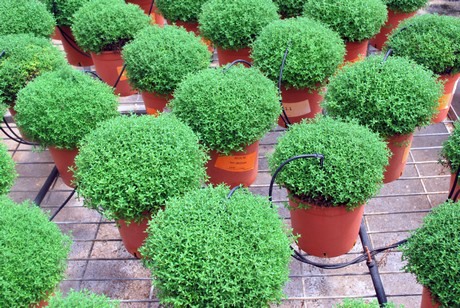
Stock plants production.
Managing the challenges
In order to keep the stock plants and therefore the plant propagation material clean and free of pathogens, Hishtil set up several security cycles including prevention, inspection and pathogen monitoring. "The first cycle is monitoring. Instead of monitoring on a weekly basis, we decided to monitor our stock plants on a daily basis. The results are being reported to the company's plant protection specialist, who evaluates the findings and to give guidelines for implementation. In this way, we can quickly react on any pest. And when the plant material is ready to leave the greenhouse, it is being checked again. Additionally, an external official plant protection expert, supervises the cleanliness from pests and approves the greenhouse for export."
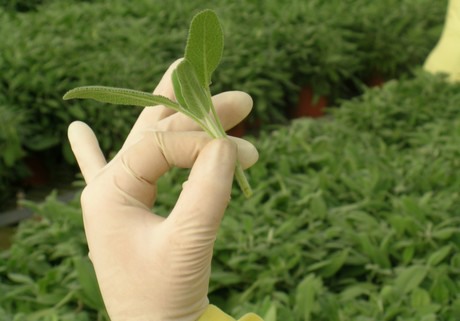
Cuttings standard.
Hishtil prefers to work with as less chemicals as possible. "When we can work with biological control products or other non-chemical methods, we do. However there are situation where bio-control cannot fulfill the job", says Pass. So, on a routine regime, they spray and use their own designed device. "As we can only use very few chemicals, doing a good and accurate job is very important. In pesticide application, a spray lance is most often used. However with a lance, the chemicals are often not equally spread as the nearby plants receive a lot of chemicals while the others do not. So, together with a Professor from the Israeli Agricultural Research Organization (ARO), we worked on a sprayer that enables us to spray more efficient and accurate. This sprayers, the so called self propelled air assisted sprayer, spreads the right and same amount of chemicals to all of our plants." And this new sprayer shows that looking for innovations is an important part of Hishtil's business. "We have an in-house R&D Department, with a professional PhD in Plant Protection in charge who is testing new innovations all the time."
However, according to Pass, the set up of these security cycles and using innovative tools are not a guarantee of success. "It is all about managing the small details", he says. "Everyone who enters the greenhouse needs to have a special discipline. The staff regularly receives trainings on sanitation and plant protection issues. Additionally, one is being checked and tested on a frequent basis, according to the ISO quality control system."
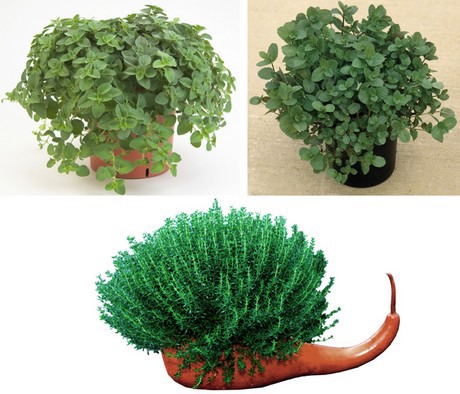
Upper pictures: Oregano Aureum Green, Menthe Piperita. Bottom picture: Thymus Culgaris Faustinoi.
Future
Pass envisions that the segment of organic herbs will become bigger and more important in the future. "For this reason, we have to keep looking for tools and in particular green tools to enhance the quality of our crop. And for these tools we are are looking beyond agriculture. In the food industry, for example, we have found an innovative UV system to disinfect the water, instead of using chemicals. And our R&D department is continuously looking for these kinds of solutions."
For more information
Hishtil
Nadav Pass
Email: [email protected]
www.hishtil.com
